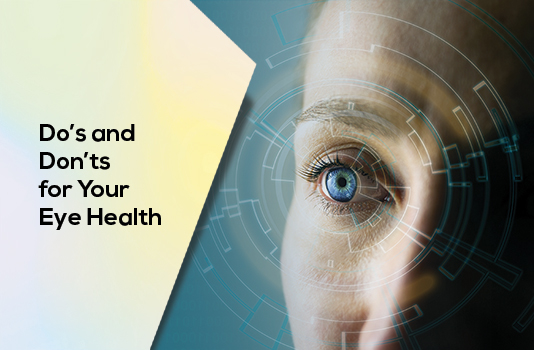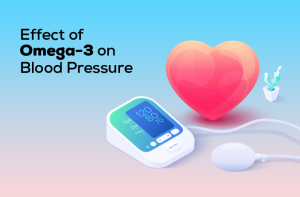Eyes are undeniably an important part of our life – primary receptors to everything that goes around us. They are a delicate organ prone to damage resulting from ageing, lifestyle diseases, extreme exposures or accidental injuries.
Modern lifestyle and work environment of staring continuously at the television, laptop and smartphone screens have accelerated the damage to our eyes.
The blue light emitted out of the screens can cause discomfort and eye strain.
Recent research indicates an array of eye related complications like blurred vision, headaches, sore eyes, muscle strain, and dry eyes has come up to people, staring at those screens.
Good vision helps us perform efficiently – at work, home or when you’re just exploring outside. That’s why it’s important to take a little extra care of this key organ.
Taking care of the eyes is simple – browse through the list of 6 do’s and don’t to take care of those delicate eyes.
Do’s
1. Eat for your eyes
Right nutrition and healthy habits are two key things with the ability to solve almost all our body problems. A balanced diet and proper care of your eyes are enough to keep the eye doctor away.
Omega-3 (specifically DHA), Lutein, Zeaxanthin, Beta carotenoids, Curcumin, Lycopene, Vitamins are key ingredients for proper vision.
Omega-3 fatty acids help in vision development and relieve dry eyes and chronic inflammation of the eyelids.
Tuna, Salmon, Flaxseed, Avocado, walnuts are some of the good sources of Omega-3 and should be a part of your regular diet.
Carrots, squash, cantaloupe, red peppers, and yellow bell peppers contain Beta carotene, which is a good source of Vitamins A.
Vitamin A along with Vitamin C, Vitamin E, Zinc, and copper reduce the risk of age-related macular degeneration (AMD), a disease that affects the central vision.
Seasonal vegetables, especially dark green leafy veggies like spinach, broccoli, and fruits like watermelon contain lutein, an antioxidant that protects and boosts eye health and therefore should be consumed in ample quantity.
2. Rest for your eyes
We use our eyes for the most part of the 24 hours cycle. They also need a break.
Our eye muscle starts feeling fatigued after prolonged usage and therefore a proper eye rest and good sleep are essential for healthy eyes.
Constant staring on laptops and the mobile screen doesn’t help either because it robs you of your ability to bat your eyelids – the split second but much needed rest for your eyes.
Give a break to your eyes from the laptop and smartphone.
Don’t forget the golden 20-20-20 rule i.e. after every 20 mins of looking at a screen, look at a distance of 20 ft for about 20 seconds.
3. Proper positioning of the screen for your eyes
If your work requires you to be in front of a screen for a longer duration, position your screen to about 20-24 inches from your eyes and at an angle of 10-150 below your eye level.
Our eyes will close slightly when we are viewing the screen, which minimizes the fluid evaporation from our eyes.
4. Be Protective of your eyes
Protect your eyes from the dust, extreme heat, glint, and sunlight.
Check the product expiry date of everything that we out into our eyes. This includes eye drops, eye lotions, and eye makeup.
Check the status of cosmetic products as well. Bacteria hanging around in mascara or other eye cosmetics can end up causing an eye infection.
5. Wash hands for your eyes
Many of the common eye infections are infectious in nature and can easily transmit from one person to another.
Adopt the habit of washing hands as and when required including before and after putting contact lenses.
This can prevent you from catching common illnesses such as common cold (watery eyes), pink eye, skin infection as well as avoid something unwanted to enter your eyes through your hands (for e.g. spicy hands, infecting contact lenses)
6. Exercise for eyes
Avoid eye fatigue by doing a set of exercises. Use multiple simple exercises to provide rest to your eyes.
Incorporate the golden 20-20-20 rule every time you are staring at a screen too long.
Rub your palms and place them on your eyes. Hold them there for 5 seconds. Repeat it at least 5-10 times.
Simple eye exercises provide our eyes much needed rest and relax the strain on eye muscles.
Don’ts –
1. Don’t stare at a screen for too long
Don’t spend too long staring at the screen of your laptop or smartphone.
While the ‘night mode’ and ‘anti-glare’ features claim to reduce eye strains, the best option is still to switch off the screen.
Give your eye break and walk around for a few minutes after every hour of working in front of a laptop screen.
2. Don’t smoke
While the effects of smoking on lungs are well known, it is relatively less common knowledge that smoking can affect your vision too.
Smoking generates additional free radicals thus challenging the neutralization capacity of natural antioxidants in the body. The increased number of free radicals put oxidative stress on the eyes and damage the lens proteins
3. Don’t skip on the eye test
Don’t skip on the regular checkup of your eyes.
Getting a regular eye exam can help in detecting early signs of blurry vision, cataract, damage to the retina, or eye issues like glaucoma, diabetic eyes, and macular degeneration.
4. Don’t read/work in poor lighting
Our eyes are already prone to fatigue. Don’t overstress them by working in low light or moving conditions.
Our eyes have to do additional work to focus when either the subject is moving (car, train, etc.) or the light is not ambient (dim or extremely bright light).
5. Don’t expose your eye to glares
The retina of the eye is a sensitive part.
Do not expose your retina to glare or glint or direct exposure by staring too long at sunlight, bright lights, laser pointers, screens.
Protect your eyes with appropriate sunglasses, anti-glare lenses.
6. Don’t stay inactive throughout the day
Being active also helps us stay healthy. The physical activity along with a good diet lowers the risk of conditions like obesity, diabetes, high cholesterol, etc. which carries a risk of vision impairment with them.
Bottom Line
The eye is an important but delicate organ of our body. It’s an asset that enables us to not only see the marvels of the world but function our daily activities smoothly and efficiently.
Taking a little extra care, eating right, providing rest and avoiding things that can damage your eyes is all that is needed to enjoy the world. Not through a lens or in black color but in its full glory of more than 65 million colors that your eye can visualize for you.













